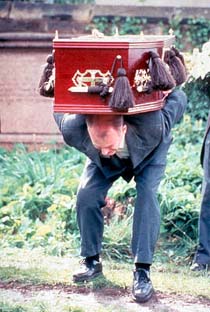 |


|
|
|
|
At some point in the Scottish import Orphans, it subtly transforms from a
British realist Channel 4 tele-film into something miraculous. Its rhythms,
images, performances, and structure become unlike anything I've ever seen
before.
As its title suggests, Orphans even shares a theme that recurs in the works of those musical artists: the need for connection and the frustration of connection deterred. The film opens at the wake of a mother of three grown brothers and a sister. Having lost their father and, now, their mother, they are the orphans of the film's title. The scene at the wake consists mostly of a static long take. During the shot, the children of the dead mother cut locks of hair and place them in the casket, and then kiss their mother goodbye. Perhaps a predilection toward performance-based filmmaking from the directorial debut of an actor, here Peter Mullen, leads to the misconception that this will be an "uncinematic" film. Mullen deliberately details the characters' strained interaction and the space of the actors' performances in this long take. He practically invites audiences to disregard the striking composition: each sibling steadfast at a side of the coffin with the sister in the foreground, the back of her wheelchair facing the camera.
That begins the separate journeys of the siblings on the night before their mother's funeral. The question, "Who?" haunts them, much as the night's storm that eventually takes the roof off of a church brings back the memory of the four children comforted during a storm by their mother. The question also makes their story familiar - a defiantly specific story made a felicitous expression of general modern tumult. The vivid events, somewhere between nightmare and Bible story, become unexpectedly intimate. "Orphans" achieves artistic connection. The orphans discover the answer to the question by connecting with each other. They do so through their personal narrative crucifixions and resurrections. The actors' responses give moral urgency to each momentary eternity. Michael spends the night roaming the city looking for his sister Sheila (Rosemary Stevenson), who has cerebral palsy and is stranded when her wheelchair loses power. She had left the eldest sibling, Thomas (Gary Lewis), alone at the church where the funeral will take place in the morning. Thomas chooses to rebuild a shattered Virgin Mary with candle wax, rather than rebuild his disparate and desperate family. The life is literally bleeding out of Michael. His wounded body the physical sign of the wounded soul we witness during the night. It culminates in Henshall's performance when, trying to pass off his knife wound as a work accident, he calls out: "I want my compensation. I want my comp. . . comp. . . comp. . . I want my mommy!" His face collapsing in anguish, Henshall makes the transition from an expression of material need to one of spiritual want. It's the most devastating moment, of many, in Orphans. Through each character, Orphans realizes in film terms what the best music accomplishes: an uncanny call-and-response between lyrics-music-performance-audience. The story gives each actor opportunities to perform miracles. Mullen's cinematics provide expansive perspective and context. The imagination dances. Nobody is an orphan. |

© 1997-2002 BEI
 Gary Lewis plays Thomas in Orphans
Gary Lewis plays Thomas in Orphans